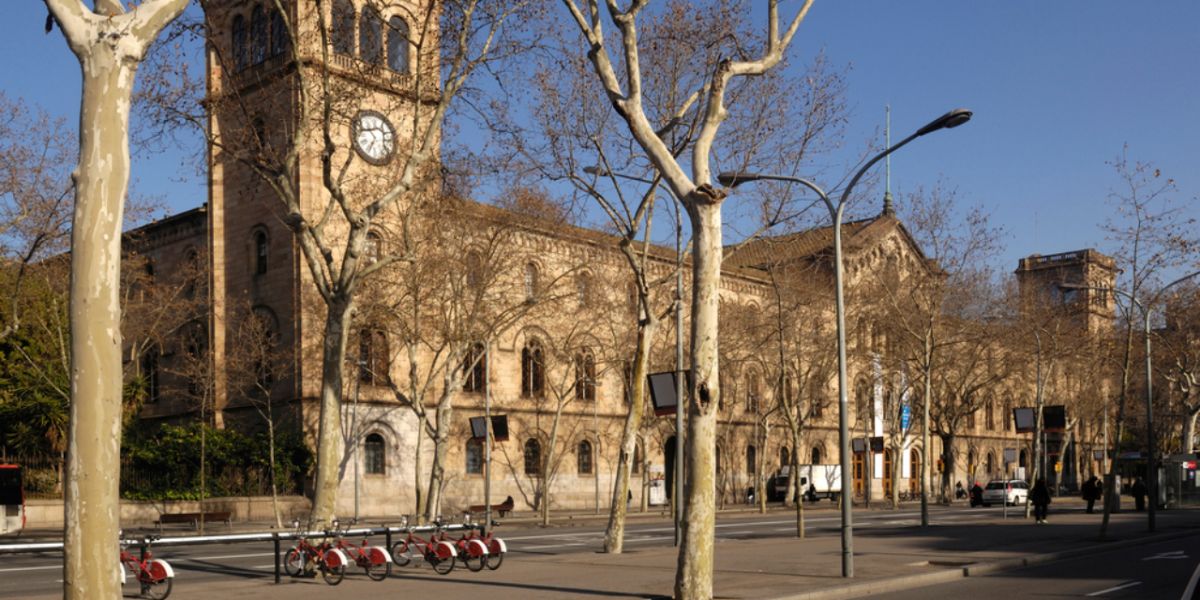
Barcelona is Catalonia's cosmopolitan capital and an ideal place for university education. The city has a well-established network of public and private universities and other higher education institutions. If you're thinking of studying in the city, here is the information you need to know.
When planning to study abroad in Spain, be sure to read more about formalities and applying for a student visa in S pain. You may also be interested in reading about Barcelona's student life.
Why study in Barcelona?
The city offers a broad spectrum of universities, including the prestigious University of Barcelona and the Autonomous University of Barcelona. According to the World University Rankings 2024, the University of Barcelona is ranked among the top 200 universities in the world.
Many of Barcelona's universities have tie-ups with multinational corporations meaning there are considerable career opportunities once you have completed your studies.
With a Mediterranean climate, you can enjoy sunny weather throughout most of the year.
Staying in Barcelona means spending some of your downtime on the beach. There are several within easy reach of the city center.
When you want to let your hair down at night, you can take advantage of one of Europe's top nightlife destinations.
Spanish and Catalonian cuisines are excellent, and there are many affordable restaurants for students.
There are countless sights and attractions in B arcelona, from the Sagrada Familia and Park Guell to Cam Nou Stadium and museums and galleries.
The city has a strong cosmopolitan vibe.
Most of the city is flat, so it is easy to get around by bike. There is also an excellent bike-sharing scheme.
Choosing a university in Barcelona
Once you have decided to study in Barcelona, the next decision concerns where to study - in a university, higher education institute or business school?
Here is a closer look at some of the options available to you:
Pompeu Fabra University (UPF)
This public university offers bachelor's degrees, master's degrees and doctorates covering multiple disciplines, including life and health sciences, communication, law, political and social sciences, humanities and engineering. As of 2025, more than 50 bachelor's and around 90 master's degree programs are offered, several in English.
University of Barcelona (UB)
This public university educates around more than 60,000 students each year and is the most innovative university in Spain, according to the news agency Reuters. It is home to 17 faculties, 16 libraries and 10 affiliated centers, including the Faculty of Fine Arts, the Faculty of Biology, the Faculty of Philosophy and the Faculty of Medicine and Health Sciences. Students can take their pick of bachelor's, master's, and postgraduate degrees, doctorate programs and lifelong learning courses. As of 2025, there are 72 bachelor's and 173 master's degree programs.
Autonomous University of Barcelona (UAB)
A public university founded in 1968 and currently offering more than 100 bachelor's degree programs, 140 master's degree programs and 68 Ph.D. programs spread across 57 departments. The main campus is at Cerdanyola del Vallès, about 20 kilometers from the center of Barcelona.
Polytechnic University of Catalonia (UPC)
The largest engineering university in Catalonia also has study programs in other disciplines, such as architecture and mathematics. Its 18 educational centers currently offer 67 bachelor's degrees, 91 master's degrees, 45 doctoral programs and 141 continuing education programs.
Menéndez Pelayo International University
This public university's history dates back to 1932 and has a rich academic program that includes around 20 master's degree courses in fields such as artificial intelligence, government and public administration and constitutional law. There are also doctorates and summer courses.
Ramon Llull University
This private university was established in 1990 and has several colleges located in downtown Barcelona. It offers a range of bachelor's, master's and Ph.D. programs as well as courses in its own degrees. These qualifications are in fields such as sports and sports management, psychology, music and music performance, health and communication.
Abat Oliba CEU University
This private university was founded in 1973 and provides degree and master's degree courses in a number of academic areas. They include law and political science, psychology, sport, health sciences, economics and business and communication.
VIC University (UVIC)
This privately managed university offers bachelor's degrees, master's degrees, and doctoral programs in a broad range of disciplines, including science, engineering, social studies, healthcare, language and translation and psychology.
International University of Catalonia
This private university offers bachelor's, master's and doctorate programs in several fields, such as communication, law, dentistry, family studies, medicine and health and business administration. Double degree programs are also available.
List of universities in Barcelona
At a glance, here is a list of key universities and higher education institutions in Barcelona:
Public
Autonomous University of Barcelona (UAB) (Barcelona)
University of Barcelona (UB) (Barcelona)
Polytechnic University of Catalonia (UPC) (Barcelona)
Pompeu Fabra University (UPF) (Barcelona)
Menéndez Pelayo International University (UIMP) (Barcelona)
Escola Sup. De Música de Catalunya (ESMUC) (Barcelona)
Private
Geneva Business School (Barcelona)
Ramon Llull University (URL) (Barcelona)
International University of Catalonia (UIC) (Barcelona)
VIC University (UVIC) (Barcelona)
Abat Oliba CEU University (UAO) (Barcelona)
EAE Business School (Barcelona)
EADA Esc. Of Senior Management and Administration (Barcelona)
IQS Foundation (Barcelona)
Escola Superior de Disseny (ESDI) (Barcelona)
Escola Universitària d'Hoteleria i Turisme (CETT) (Barcelona)
Fundació Universitària del Bages (FUB) (Barcelona)
ESADE Law & Business School (Barcelona)
Centre for Financial Studies (CEF) (Barcelona)
School Sup. De Comerç Internacional UPF (ESCI) (Barcelona)
Applying to a Barcelona university
There is no centralized system for university applications in Spain. Therefore, each institution sets its own requirements. You must apply directly to the university of your choice, which you can do through their website. There you will find details of what you have to do and the forms to submit. Note that you may need to get your qualifications validated and translated first before being accepted in Spain. Your prospective university will be able to advise you of whether this applies to your qualifications.
Applying for a student visa in Spain
Once your chosen university in Barcelona has accepted you, you will need to turn your attention to organizing your student visa.
If you are a European Union (EU) or Switzerland citizen, you are free to study in Barcelona without a visa. Students from countries with visa-free entry for up to 90 days will not need a visa, provided their course duration is shorter than 90 days. Students from countries that do not qualify for visa-free entry must apply for a Schengen student visa.
Students from outside the EU and Switzerland will have to apply for a visa if they are studying long-term in Spain. This should be done only after you have been accepted to a course. Make your visa application at least two to three months ahead of your intended departure date to leave enough time for everything to be processed.
The following family members can apply for a visa to accompany the student:
- Spouse or civil partner,
- Children who are minors or who have a disability.
You should apply at the Spanish embassy or consulate in your home country. There are several documents you will need to supply. They are:
- A filled-in visa application (you can download it on the website of the Spanish Embassy in your home country).
- Original passport. You may also have to provide photocopies. Make some, just in case.
- Proof of financial solvency. Bank certificate that certifies that you have sufficient funds for your stay in Barcelona as well as the funds necessary to cover the price of the program. If you benefit from a scholarship, you must present the original award document.
- Private international medical insurance. This must be from a company that operates in Spain and covers you during your stay in Barcelona.
- Letter of acceptance from the course provider, which must be signed and stamped by the university. The letter should cover details such as the total cost of the program, start and end dates, the total number of credits, name of the university, address, telephone number and the full name and identification of the student.
- Criminal record check certificate. Students who are of legal age and are applying for a visa of more than 180 days must supply a criminal background check (original and copy). This has to be from their home country or country of residence for the past five years.
If your studies are longer than six months, you may be asked to provide a medical certificate that is at most three months old.
Good to know:
As an international student in Barcelona, you may be eligible for grants and other types of financial aid from Spanish institutions, such as Santander Bank and the Spanish Agency for International Development Cooperation. To help get you started with your grant search, visit Universia and the Ministry of Education websites.
Cost of living in Barcelona
Like most students, the world over, you will pay close attention to your budget. Fortunately, Barcelona is a budget-friendly city, offering student discounts, vouchers and reasonable prices. With these advantages, your euros should go a long way. To help you plan your monthly budget, here are a few cost-of-living prices courtesy of Numbeo. They are accurate as of January 2025:
- A meal in an inexpensive restaurant - 15 euros
- 0.33-liter bottle of Coke/Pepsi - 2.37 euros
- One liter of regular milk - 1.08 euros
- 12 regular eggs - 2.93 euros
- 1 kilogram of potatoes - 1.72 euros
- A 1.5-liter bottle of water - 0.76 euros
- 1 kilogram of chicken fillets – 8.61 euros
- Monthly fee for a fitness club/gymnasium - 47.28 euros
- Cinema ticket - 9 euros
- 1 liter of petrol - 1.65 euros
- A packet of 20 cigarettes – 5.50 euros
- A mid-range bottle of wine - 6 euros
- One-way local transport ticket - 2.55 euros
- Monthly travelcard - 22 euros
- Basic utilities (electricity, heating, water, gas, rubbish) - approximately 170.35 euros per month for an 85-meter square apartment
Essential tips for expat university students in Barcelona
As soon as you can, travel around your new home city to familiarise yourself with its neighborhoods and to take in the different ambiances.
Note that some stores will close for a couple of hours during the afternoons for the traditional siesta. Therefore, don't expect to make a quick trip to a local shop at this time if you've run out of something.
Before traveling to Barcelona, research its neighborhoods to help you decide where you want to stay. Among the top neighborhoods for students are El Born, El Raval and Garcia.
With an efficient public transportation network, Barcelona is easy to get around. Save your money by purchasing season tickets.
Sort out your accommodation before you arrive in Barcelona. There are numerous choices for students, including university halls of residence, flat-sharing and staying with a Spanish family. Your chosen university should be able to advise you about places to live.
Attempt to learn Spanish or Catalan. Learning the language is one of the best ways to fit in with your surroundings and make the most of Barcelona. Take language classes and see if you can organize language exchange sessions (intercambio del idioma) with a Spanish student.
As most student finances are limited, planning your monthly budget is a good idea. Always be on the lookout for ways of saving money, such as bulk buying supermarket items and only going to museums and galleries on free days or if there are student discounts.
Connect with your university online in the weeks leading up to your move to Barcelona. By following its social media accounts, you can keep up to date with relevant news and may even make new friends. You'll start to feel a part of the university community before you're there in person.
We do our best to provide accurate and up to date information. However, if you have noticed any inaccuracies in this article, please let us know in the comments section below.








